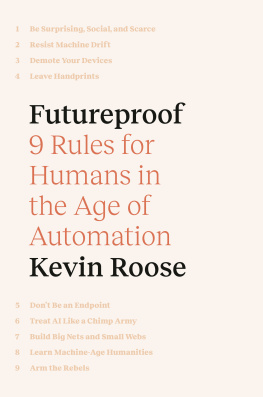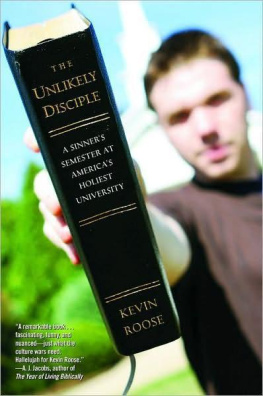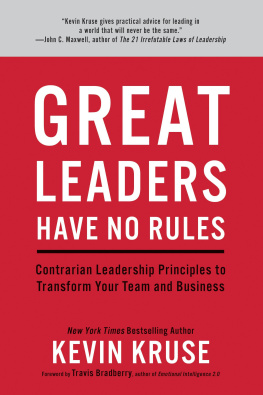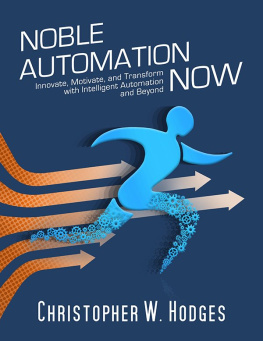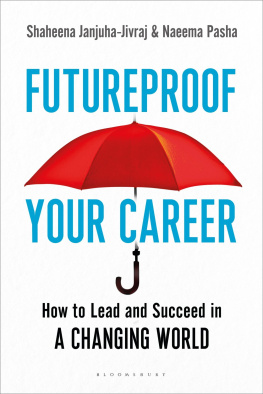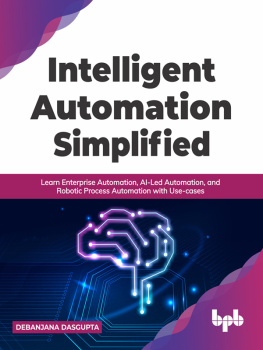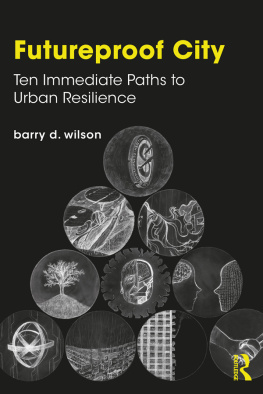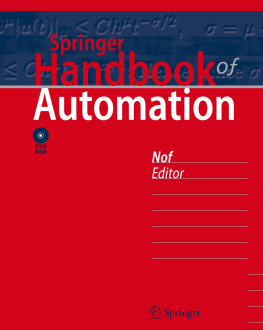Kevin Roose - Futureproof: 9 Rules for Humans in the Age of Automation
Here you can read online Kevin Roose - Futureproof: 9 Rules for Humans in the Age of Automation full text of the book (entire story) in english for free. Download pdf and epub, get meaning, cover and reviews about this ebook. year: 2021, publisher: Random House Publishing Group, genre: Politics. Description of the work, (preface) as well as reviews are available. Best literature library LitArk.com created for fans of good reading and offers a wide selection of genres:
Romance novel
Science fiction
Adventure
Detective
Science
History
Home and family
Prose
Art
Politics
Computer
Non-fiction
Religion
Business
Children
Humor
Choose a favorite category and find really read worthwhile books. Enjoy immersion in the world of imagination, feel the emotions of the characters or learn something new for yourself, make an fascinating discovery.
- Book:Futureproof: 9 Rules for Humans in the Age of Automation
- Author:
- Publisher:Random House Publishing Group
- Genre:
- Year:2021
- Rating:4 / 5
- Favourites:Add to favourites
- Your mark:
- 80
- 1
- 2
- 3
- 4
- 5
Futureproof: 9 Rules for Humans in the Age of Automation: summary, description and annotation
We offer to read an annotation, description, summary or preface (depends on what the author of the book "Futureproof: 9 Rules for Humans in the Age of Automation" wrote himself). If you haven't found the necessary information about the book — write in the comments, we will try to find it.
Kevin Roose: author's other books
Who wrote Futureproof: 9 Rules for Humans in the Age of Automation? Find out the surname, the name of the author of the book and a list of all author's works by series.
Futureproof: 9 Rules for Humans in the Age of Automation — read online for free the complete book (whole text) full work
Below is the text of the book, divided by pages. System saving the place of the last page read, allows you to conveniently read the book "Futureproof: 9 Rules for Humans in the Age of Automation" online for free, without having to search again every time where you left off. Put a bookmark, and you can go to the page where you finished reading at any time.
Font size:
Interval:
Bookmark:
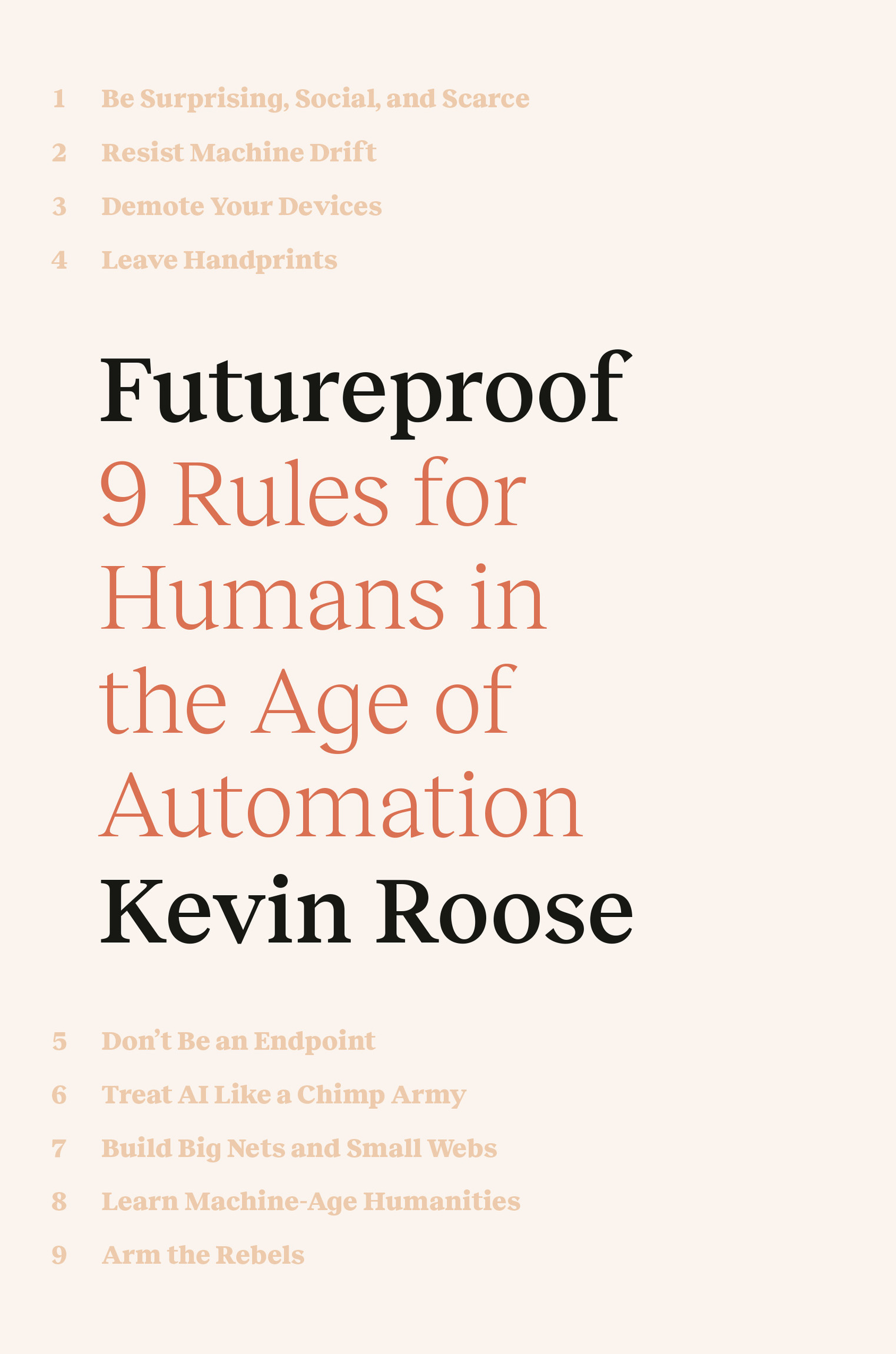
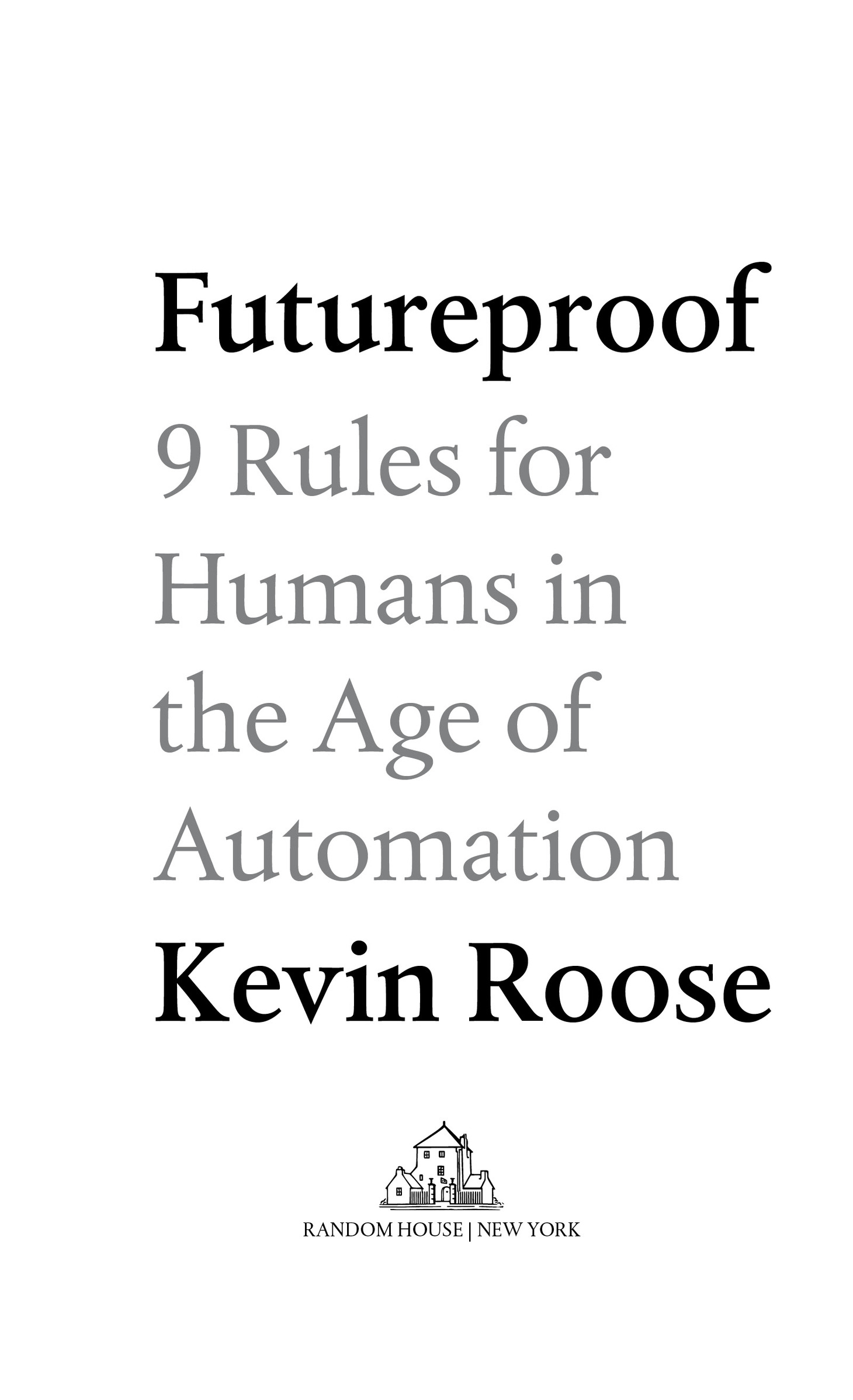
Copyright 2021 by Kevin Roose
All rights reserved.
Published in the United States by Random House, an imprint and division of Penguin Random House LLC, New York.
Random House and the House colophon are registered trademarks of Penguin Random House LLC.
Library of Congress Cataloging-in-Publication Data
Names: Roose, Kevin, author.
Title: Futureproof: 9 rules for humans in the age of automation / Kevin Roose.
Description: New York: Random House, [2021]
Identifiers: LCCN 2020001669 (print) | LCCN 2020001670 (ebook) | ISBN 9780593133347 (hardcover) | ISBN 9780593133354 (ebook)
Subjects: LCSH: Computers and civilization. | AutomationSocial aspects. | Artificial intelligenceSocial aspects. | Success in business.
Classification: LCC QA76.9.C66 R635 2020 (print) | LCC QA76.9.C66 (ebook) | DDC 303.48/34dc23
LC record available at https://lccn.loc.gov/2020001669
LC ebook record available at https://lccn.loc.gov/2020001670
Ebook ISBN9780593133354
randomhousebooks.com
Book design by Susan Turner, adapted for ebook
Cover design: Rachel Gogel
ep_prh_5.6.1_c0_r0
Proceed as way opens.
Quaker proverb
Recently, I was at a party in San Francisco when a man approached me and introduced himself as the founder of a small AI start-up.
As soon as the founder figured out that I was a technology writer for The New York Times, he launched into a pitch for his company, which he said was trying to revolutionize the manufacturing sector using a new AI technique called deep reinforcement learning.
Modern factories, he explained, were struggling with what is called production planningthe complex art of calculating which machines should be making which things on which days. Today, he said, most factories employ humans to look at thick piles of data and customer orders to figure out whether the plastic-molding machines should be making X-Men figurines on Tuesdays and TV remotes on Thursdays, or vice versa. Its one of those dull-but-essential tasks without which modern capitalism would probably grind to a halt, and companies spend billions of dollars a year trying to get it right.
The founder explained that his companys AI could run millions of virtual simulations for any given factory, eventually arriving at the exact sequence of processes that would allow it to produce goods most efficiently. This AI, he said, would allow factories to replace entire teams of human production planners, along with most of the outdated software those people relied on.
We call it the Boomer Remover, he said.
TheBoomerRemover? I asked.
Yeah, he said. I mean, thats not the official name. But our clients have way too many old, overpaid middle-managers who arent really necessary anymore. Our platform lets them replace those people.
The founder, who appeared to be a few drinks deep, then told a story about a client who had been looking for a way to get rid of one particular production planner for years, but could never figure out how to fully automate his job away. But mere days after installing his companys software, the client had been able to eliminate the planners position with no loss of efficiency.
Slightly stunned, I asked the founder if he knew what had happened to the production planner. Was he reassigned within the company? Was he just laid off unceremoniously? Did he know that his bosses had been scheming to replace him with a robot?
The founder chuckled.
Thats not my problem, he said, and headed to the bar for another drink.
Ive loved technology since I was a kid, when I spent all my free time building websites and saving up allowance money for new PC parts. And for years, I rolled my eyes whenever someone suggested that computers would destroy jobs, destabilize society, or usher us into a futuristic dystopia. I was especially dismissive of people who predicted that AI would one day make humans obsolete. Werent these the same panicky technophobes who warned us that Nintendo games would melt our brains? Didnt their fears always end up being overblown?
Several years ago, when I started as a tech columnist for the Times, most of what I heard about AI mirrored my own optimistic views. I met with start-up founders and engineers in Silicon Valley who showed me how new advances in fields like deep learning were helping them build all kinds of world-improving tools: algorithms that could increase farmers crop yields, software that would help hospitals run more efficiently, self-driving cars that could shuttle us around while we took naps and watched Netflix.
This was the euphoric peak of the AI hype cycle, a time when all of the American tech giantsGoogle, Facebook, Apple, Amazon, Microsoftwere pouring billions of dollars into developing new AI products and shoving machine learning algorithms into as many of their apps as possible. They wrote blank checks to their AI research teams, and poached professors and grad students out of top computer science departments with frankly hilarious job offers. (One professor told me, in hushed tones, that a tech company had just offered one of his colleagues a $1 million annual contract that only required him to work on Fridays.) Everywhere you looked, start-ups were raising gargantuan funding rounds, promising to use AI to revolutionize everything from podcasting to pizza delivery. And the conventional wisdom, at least among my sources, was that these new, AI-based tools would be an unequivocally good thing for society.
But in the past few years, as Ive spent more time reporting on AI and automation, three things have made me rethink my optimism.
First, as I studied the history of technological change, I realized that some of the stories technologists liked to telllike the narrative that technology had always created more jobs than it destroyed, or that humans and AI would collaborate rather than compete with one anotherturned out to be, if not false, then at least radically incomplete. (Well take a closer look at some of these narratives, and the holes they contain, in Chapter 1.)
Second, as I reported on the effects AI and automation were having in the world, I saw a stark gap between the promises these technologies creators had made and the actual, real-world experiences of the people using them.
I interviewed users of social media platforms like YouTube and Facebook, who had thought that those platforms AI-driven recommendation systems would help them find interesting and relevant content, but who had instead been led down rabbit holes filled with misinformation and conspiracy theories. I heard about teachers whose schools had implemented high-tech personalized learning systems in hopes of improving student outcomes, but who had found themselves fumbling with broken tablet computers and erratic software. I listened to the complaints of Uber and Lyft drivers who had been lured by the promise of flexible employment, but then found themselves suffering under the thumb of a draconian algorithm that nudged them to work longer hours, punished them for taking breaks, and constantly manipulated their pay.
All of these stories seemed to indicate that AI and automation were working well for some peoplenamely, the executives and investors who built and profited from the technologybut that they werent making life better for everyone.
Font size:
Interval:
Bookmark:
Similar books «Futureproof: 9 Rules for Humans in the Age of Automation»
Look at similar books to Futureproof: 9 Rules for Humans in the Age of Automation. We have selected literature similar in name and meaning in the hope of providing readers with more options to find new, interesting, not yet read works.
Discussion, reviews of the book Futureproof: 9 Rules for Humans in the Age of Automation and just readers' own opinions. Leave your comments, write what you think about the work, its meaning or the main characters. Specify what exactly you liked and what you didn't like, and why you think so.

